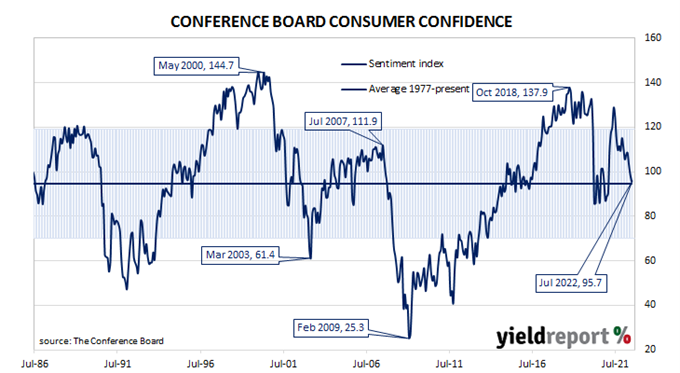Summary: Conference Board Consumer Confidence Index deteriorates again in July; reading less than consensus expectations; views of present conditions, short-term outlook both deteriorate; “recession risks persist”; inflation, rate hikes likely posing strong headwinds for consumer spending.
US consumer confidence clawed its way back to neutral over the five years after the GFC in 2008/2009 and then went from strength to strength until late 2018. Measures of consumer confidence then oscillated within a relatively narrow band at historically high levels until they plunged in early 2020. Subsequent readings then fluctuated around the long-term average until March 2021 when they reached elevated levels. However, a noticeable gap has since opened between the two most-widely followed surveys.
The latest Conference Board survey held during the first three weeks of July indicated US consumer confidence has deteriorated again. July’s Consumer Confidence Index registered 95.7 on a preliminary basis, less than the median consensus figure of 96.4 as well as June’s final figure of 98.7.
Consumers’ views of present conditions and the near future both deteriorated again. The Present Situation Index dropped from June’s revised figure of 147.2 to 141.3 while the Expectations Index slipped from a revised figure of 65.8 to 65.3.
“The Expectations Index held relatively steady, but remained well below a reading of 80, suggesting recession risks persist,” said Lynn Franco, a senior director at The Conference Board. “Concerns about inflation, rising gas and food prices in particular, continued to weigh on consumers.”
Short-term US Treasury yields moved a little higher on the day. By the close of business, the 2-year Treasury bond yield had added 2bps to 3.05% while 10-year and 30-year yields both finished unchanged at 2.80% and 3.03% respectively.
In terms of US Fed policy, expectations for a higher federal funds rate over the next 12 months softened slightly. At the close of business, July contracts implied an effective federal funds rate of 1.68%, 10bps higher than the current spot rate while September contracts implied a rate of 2.54%. July 2023 futures contracts implied 3.13%, 155bps above the spot rate.
“As the Fed raises interest rates to rein in inflation, purchasing intentions for cars, homes and major appliances all pulled back further in July,” Franco added. ”Looking ahead, inflation and additional rate hikes are likely to continue posing strong headwinds for consumer spending and economic growth over the next six months.”
The Consumer Confidence Survey is one of two widely followed monthly US consumer sentiment surveys which produce sentiment indices. The Conference Board’s index is based on perceptions of current business and employment conditions, as well as respondents’ expectations of conditions six months in the future. The other survey, conducted by the University of Michigan, is similar and it is used to produce an Index of Consumer Sentiment. That survey differs in that it does not ask respondents explicitly about their views of the labour market and it also includes some longer-term questions.



